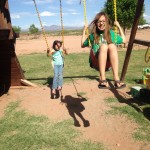My teaching assignment changed this year, about five weeks into the first quarter. Due to a district policy of only counting “bodies in seats,” not enrolled students, our 5th-grade class sizes were huge (36 – 38 students in tiny portable classrooms) so we were eventually given the “go ahead” to open another class. Instead of team teaching with my usual partner, we became a team of three, teaching three blocks of students daily. The change has negatively impacted my state of mind and stress levels in ways I would never have dreamed of. It wasn’t the hunt for a qualified teacher that did it (there were NO elementary or middle school teachers in the district pool – we were lucky to coerce a fabulous parent who happened to be a qualified sub). It wasn’t the horrendous task of deciding which students to move to the new class (no matter how carefully you do it, feelings are hurt and parents are understandably furious). It wasn’t even the change from having 60 students to 90 students, or shorter blocks of class time. Upon reflection (thank you, fall break) I realized that the change isn’t really about the extra class, the extra parents, or the extra grading load. It’s about having even less time to reflect, which to me is a crucial and often overlooked working condition.
I learned the value and necessity of reflection through the National Board Certification process. The Five Core Propositions include thinking systematically about teaching practice and learning from experience. Reflection is a standard that is present in every certificate area and an element embedded in every component throughout the process.
Researchers agree on the importance of reflection. Michael Fullan pointed out that teachers need uninterrupted time to think about what they have taught and how it has impacted them and their students. Betty Steffy noted that teachers need time to reflect in order to identify areas in need of development and that reflection is a crucial part of being an excellent career teacher. She stated that when reflection is missing, teachers are likely to begin to withdraw and disengage. Yet Daniel Duke rightly declared that teachers do not have the time or space they need to reflect while at school.
Our school day is pretty average – roughly seven hours long, about six of which I spend with my students. Of course, this does not include time spent tutoring or running extra-curricular activities which adds an additional two hours a day of time with students (on average) for me. That’s about eight hours a day of time with students!
This appears to be a uniquely American situation. We spend much more time with our students than our international counterparts. Out of all the countries in who participated in the 2013 Teaching and Learning International Survey (TALIS), American teachers had the most student contact hours (time teaching students) – 39% more hours. American teachers spend an average of 981 hours per year with students compared to an average of 712 per year internationally. (Note: this survey is self-reported and a new analysis shows there may be inaccuracies. Time spent tutoring, teaching over lunch, etc. should not be reported but the analysis shows that those hours may have been included in the surveys.) I believe our situation is even more critical in Arizona, given that we have the second highest class sizes in the nation. This gives us more grading, more communication, etc.
While I love time spent with my students, the TALIS points out that I have less time to collaborate with my colleagues, study my craft, plan enriching lessons, assess student work, and communicate with parents. That means I do it all on my own time, which means even less time to reflect and process. This is what people outside the profession don’t realize when they complain about teachers working “8:00-3:00 with summers off.”
Some policymakers operate under an “anyone can teach” mentality. I disagree. Teaching is complex, difficult work, and is physically, cognitively and emotionally engaging and challenging. The art and science of teaching many students every day requires careful, thoughtful reflection. We work hours and hours before the first bell and beyond the last bell daily. If we didn’t, parents would never receive communication, students would never receive feedback, and lessons plans would not be created.
One solution to this working condition is more recess for students, which would benefit teachers and students. Often-praised Finland has a school day roughly the same as a typical American school day but with triple the recess time. In Finland, this is time that teachers collaborate with peers, plan lessons, hone their content or pedagogical knowledge, and reflect on the challenging practice of teaching.
We know that better working conditions keep teachers in the profession. Creating better conditions, including time for reflection to critically examine teaching practice, is an important factor in improving teacher quality, retaining good teachers in the profession, and helping to solve our teaching crisis. So if you can find the time, reflect on that!










Comments 6
Hi Beth, I heard once that you don’t learn from experiences, you learn from thinking about them. What stinks about the lack of time we have to reflect is that it’s accompanied by a corresponding chance to correct small problems in a timely manner and that leads to an accumulation of unsolved problems that only grow with time.
Well-stated. Especially when our actions impact our relationships with students and families and even the smallest mis-step that we overlook could affect a student’s perception of school or their potential in a powerful way. It is crucial to have the opportunity to think clearly. The rapid-fire pace of our days works counter to that.
I teach in MA (which is consistently rated best in the country for education) and our school district has 6 hour school days and fewer calendar days than AZ.
That is very interesting! Thanks for sharing.
I reflect on this problem often I think the lack of time to reflect is compounded by the stress of an overwhelming workload. Teachers are in a constant state of frenzy so that, even if they do find a few minutes to reflect, the brain just isn’t in a state to do so. When teachers don’t have time to reflect and plan good FIRST instruction, kids may not accurately learn and retain the content. This leads to a horrible cycle of reteaching and practicing that takes extra time and slows the class down. I’ve worked on a few campuses with after school grant programs that require participating teachers to spend an extra 2 hours a day with students. I’m fascinated by this question: How do these grant programs affect the quality of first instruction for the teacher’s caseload–and in return, create an ongoing need for after school programs for kids who fall behind. Hopefully, someone out there is studying this phenomenon. We can’t keep burdening AZ teachers with more students and more time WITH students. This leads to burnout, overworking, and/or changes to the quality of first instruction. Great post! Looking forward to reflecting on it some more
I think the lack of time to reflect is compounded by the stress of an overwhelming workload. Teachers are in a constant state of frenzy so that, even if they do find a few minutes to reflect, the brain just isn’t in a state to do so. When teachers don’t have time to reflect and plan good FIRST instruction, kids may not accurately learn and retain the content. This leads to a horrible cycle of reteaching and practicing that takes extra time and slows the class down. I’ve worked on a few campuses with after school grant programs that require participating teachers to spend an extra 2 hours a day with students. I’m fascinated by this question: How do these grant programs affect the quality of first instruction for the teacher’s caseload–and in return, create an ongoing need for after school programs for kids who fall behind. Hopefully, someone out there is studying this phenomenon. We can’t keep burdening AZ teachers with more students and more time WITH students. This leads to burnout, overworking, and/or changes to the quality of first instruction. Great post! Looking forward to reflecting on it some more 
Reflection is so powerful!!! I remember back in the 90’s, my WA school district studied the art (yes, ART) of Japanese lesson planning. They spend HOURS pouring over lesson plans, reflecting on the effectiveness, and determining the next steps, based on their complex collaboration. I would love to do that more… but yes, we need more time.